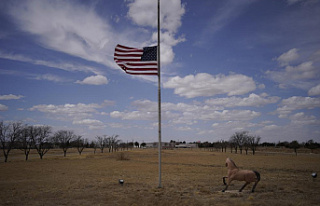This was because Russia had pressed its war against Ukraine. Then, they fell again after coronavirus concerns in China raised fears of a global slowdown.
McDermott stated that his family-owned business will increase drilling slightly if oil prices stabilize. McDermott is currently on the sidelines, waiting to see how oil prices stabilize and trying to find enough workers to oversee the 100 oil wells that the company owns. This includes wells that were left idle during the pandemic he has been trying to eradicate since last year.
The move by President Joe Biden to prohibit Russian oil imports in response to its invasion of Ukraine was met by Republican demands to increase U.S. production in order to reduce high gasoline prices. The White House also called for more drilling, citing the war in which it reneged on Biden's campaign promise to limit drilling on public lands due to climate change.
However, the industry's reality is that there's no way to quickly increase crude oil production in the United States. There aren't enough workers to expand rapidly, and little money to drill. Industry representatives, analysts, and state officials agree that today's high price won't last.
McDermott stated, "It would have been great to produce more domestically." "(But) it's so volatile. We haven’t had access to capital in years. Money would need to be derived from existing production if we were to drill. It is a risky venture.
Republicans from energy states have ignored the industry's logistical limitations to blame Democrats and Biden for the slow growth of U.S. crude oil. Ted Cruz from Texas and Steve Daines from Montana called for more drilling on public lands and an end to American energy production. Daines claimed that Democrats used the Russia oil ban as cover-up for a scheme to "ban all oils."
The U.S. does not import much Russian oil, and Biden's administration effectively stopped new oil and natural gas lease sales from federal waters and lands. It has approved nearly 4,000 new drilling permits for federal lands, and thousands more are in stock. Jen Psaki, spokesperson for the White House, said that companies should use these permits to "go get more supplies out of the ground."
About 25% of U.S. crude oil comes from federal energy reserves. The remainder is private, tribal, and state land.
As the industry recovered from the pandemic, pumping rates increased slowly in Biden's first full year.
Analysts believe that obstacles to oil production in the United States are not difficult to overcome. However, it will take months to resolve and it could be late next year or early next year before significant increases in production.
McDermott stated that there will be a slower pace of growth in fields like ours. Everyone in the industry would agree that a consistent price is a good thing. It allows you to know what you'd get over a long period of time, making it easier to make business decisions.
The world is looking for other sources in the short-term. Last week, the United Arab Emirates stated that it would ask OPEC to increase oil production. This sent oil prices plummeting. Jim Krane, Rice University energy researcher, stated that Saudi Arabia has approximately 2 million barrels per day of extra capacity.
Comparatively, the U.S. produced about 11 million barrels per day last year.
Robert Johnston, from Columbia University's Center on Global Energy Policy, stated that even with favorable conditions, such as strong prices, political pressure, and less-cautious investors, companies in the U.S. could see their production rise by just slightly over 1 million barrels per day by the end of this year.
The Gulf of Mexico is home to some of the largest U.S. Reserves. It takes years to finance, build, and place the huge platforms in deep Gulf waters.
Andy McConn, Enverus' energy analytics company, stated that a near-term crude increase would need to come from existing onshore oil resources, such as the Permian Basin of New Mexico and Texas, and the Bakken in North Dakota and Montana. These data are used by government agencies and industry.
There is no way to open the tap in these areas. McConn stated that the most accessible reserves have already been drilled.
He said, "There are not many low-hanging fruits."
As the industry recovers from the pandemic slowdown and oil production is rampant, some oil-producing regions are already showing signs of improvement. The Permian Basin, which has 45,000 wells, was the busiest area in the country, according to the Energy Information Administration. McConn stated that other oil areas could be expanded in Oklahoma's Midcontinent and Colorado's D-J Basin.
Permian Basin operators described steady growth since last spring. They were producing 5 million barrels per day by January.
The mood is still different this time. Stephen M. Robertson, Permian Basin Petroleum Associates, stated that it's not the same mentality as before.
He said that there are many factors that can temper a production boom. These include volatile prices, labor issues, longer wait times for parts being manufactured and shipped, and longer waiting times. It has been difficult to find even the cowboy boots that some workers love.
"It's not one factor telling the industry what it should do. Robertson stated that it's not only high prices.
If the conflict in Ukraine continues, prices will remain high, and logistical obstacles are overcome. Companies could then move into untapped areas, such as Wyoming's Powder River Basin or Utah's Uinta Basin.
It won't be like the booms that have swept through these regions in the past decade, drawing thousands to work in rural areas and transforming them into industrial centers.
Larry Scott, an engineer who worked for many decades in the oil industry, now represents a section of the Permian basinin as a Republican in New Mexico Legislature. He said that oil and gas companies still need to overcome the labor problem.
He stated, "You can't scale up if there aren't qualified people to do the job."












